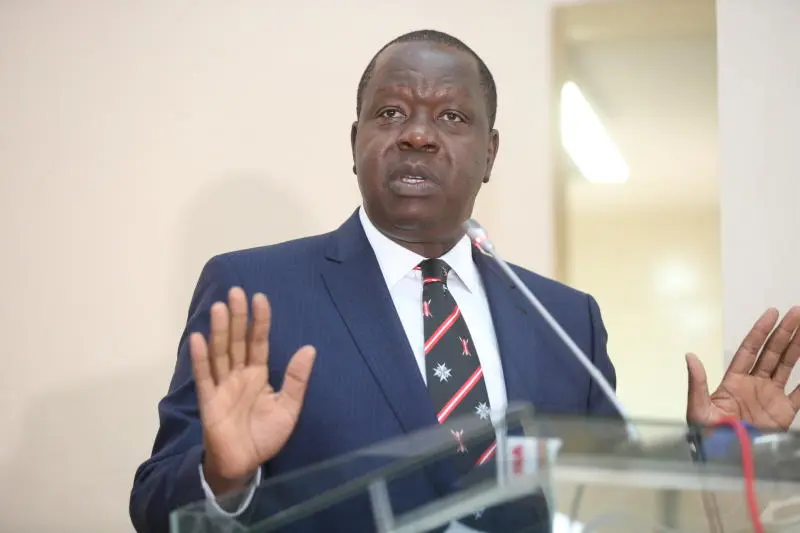NEMA’s directive, issued in a letter signed by County Director of Environment Solomo Kihiu, targets Tarita Farmers’ ambitious projects: commercial greenhouses, a petrol station, and a large-scale water storage facility. These developments, already partially operational, have been deemed unlicensed and environmentally risky, prompting NEMA to demand a comprehensive report and an immediate suspension of activities. The order follows mounting protests from the Kapkuis/Kamaura Residents Association, who argue that the projects endanger human life, livestock, and the environment.
Led by community secretary Simon Kipkogei Kimutai, residents have voiced fears over chemical contamination from pesticides and fertilisers, fire hazards from the petrol station, and increased traffic risks on narrow village roads. “We will not compromise our safety,” Kimutai declared at a charged meeting attended by Assistant County Commissioner Linada Jaleta. The community’s demand for a thorough environmental impact assessment (EIA) underscores a broader grievance: the absence of public participation in a project tied to one of Kenya’s most powerful public officials.
At the heart of this saga lies Daniel Kiptoo, a figure whose role as EPRA’s Director General places him at the nexus of Kenya’s energy sector. His association with Tarita Farmers Company Limited, part of the broader Tarita Group with interests in energy, mining, and green technology, raises uncomfortable questions about the intersection of public office and private enterprise. Sources within the community allege that Kiptoo’s influence may have enabled the projects to proceed without proper NEMA licensing, a claim bolstered by a widely circulated audio recording, reportedly featuring a close relative of Kiptoo, asserting that approvals were secured.
This perception of regulatory impunity has galvanised local resistance. Residents accuse Tarita Farmers of flouting earlier stop orders, with construction allegedly continuing despite NEMA’s directives. The Assistant County Commissioner’s warning to the company against defying government orders, coupled with her call for Kiptoo to engage directly with the community, highlights a growing tension. “I expected him to be here, addressing his neighbours’ concerns,” Jaleta remarked, pointedly urging Kiptoo to foster goodwill rather than confrontation.
The Kapkuis/Kamaura Residents Association’s resolve reflects a broader struggle for agency in a region where powerful interests often dominate. The community’s concerns are not merely environmental but existential, rooted in fears of displacement, pollution, and loss of livelihood. The proximity of the petrol station to homes, the lack of firefighting infrastructure, and the potential for soil and water contamination from agricultural chemicals have united residents in a rare show of defiance against a high-profile figure.
Kimutai’s leadership has amplified these grievances, framing the projects as a threat to the community’s way of life. The residents’ insistence on halting operations until a proper EIA is conducted signals a demand for accountability, not just from Tarita Farmers but from the institutions meant to protect them. Their vigilance, backed by Jaleta’s directive to report any ongoing activities, underscores a community determined to hold power to account.
Beneath the local dispute lies a broader narrative of influence and governance. Tarita Farmers is not an isolated venture but part of the Tarita Group’s expansive portfolio, which includes plans for a solar-powered ammonia plant and a solar PV park in Uasin Gishu. The suspension of its projects could cast a shadow over these ventures, inviting scrutiny of the group’s environmental compliance and its ties to Kiptoo’s public role.
As a key figure in shaping Kenya’s energy policies, including the Energy Act (2019) and fuel subsidy frameworks, Kiptoo’s involvement in contentious projects risks fuelling perceptions of elite privilege.
Moreover, this saga highlights systemic challenges in Kenya’s environmental governance.
The fact that Tarita Farmers operated without NEMA’s approval raises questions about the agency’s enforcement capacity, particularly at its Eldoret branch. Recent calls to reform the Environmental Management and Coordination Act, 1999, suggest that this case could spur demands for stricter oversight of projects linked to public officials.
The Tarita Farmers shutdown is more than a local skirmish; it is a microcosm of the tensions shaping Kenya’s development landscape. It pits a powerful official against a determined community, regulatory intent against alleged impunity, and economic ambition against environmental stewardship. The outcome of NEMA’s audit, involving experts from KEPHIS and the Water Resources Authority, will not only determine the fate of Kiptoo’s projects but also set a precedent for how Kenya balances influence with accountability.
For now, the residents of Kapkuis/Kamaura stand as sentinels, watching for any sign of defiance from Tarita Farmers. Their resolve, coupled with NEMA’s intervention, sends a powerful message: no one, not even a director general, is above the law. As Kenya navigates its path toward sustainable development, this clash in Kuinet serves as a stark reminder that progress must not come at the cost of community rights or environmental integrity.
[/full]





